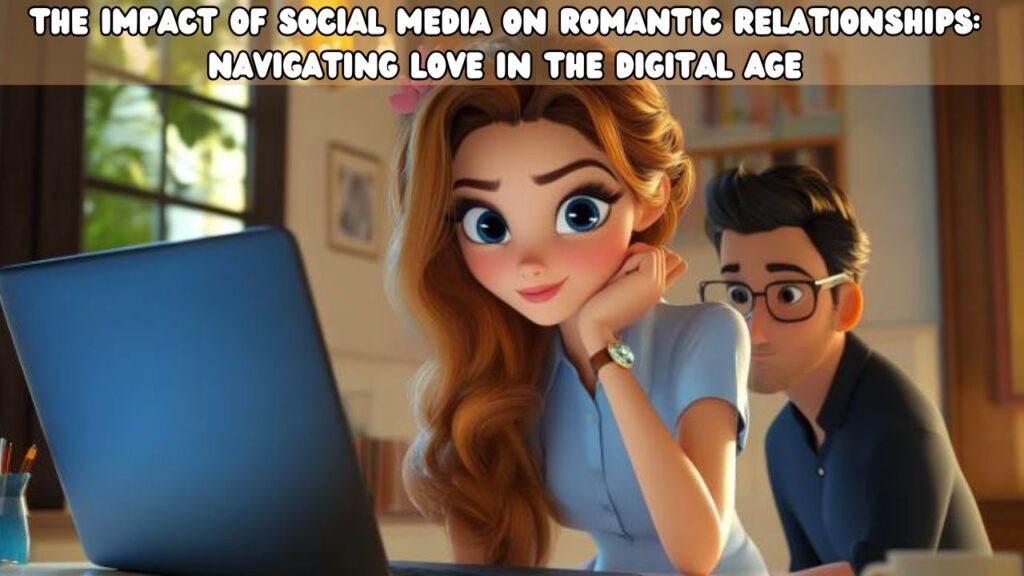In today’s world, social media has become an integral part of our daily lives, fundamentally changing the way we communicate, share information, and build relationships. The advent of platforms like Facebook, Instagram, Twitter, and TikTok has not only revolutionized our personal and professional interactions but also deeply influenced the dynamics of romantic relationships. As we navigate through the digital age, it’s crucial to understand the multifaceted impact social media has on our love lives. This article delves into how social media shapes romantic relationships, highlighting both its positive and negative effects, and offers strategies to maintain healthy connections in the digital era.
The Rise of Social Media
The early 2000s marked the beginning of a new era with the emergence of social media platforms. What started as simple tools for connecting with friends and sharing updates has evolved into complex ecosystems where billions of users interact daily. Social media’s rapid growth can be attributed to several factors:
- Accessibility and Connectivity: With the proliferation of smartphones and internet access, people can connect with others anytime, anywhere. This instant connectivity has made social media an indispensable part of modern life.
- Diverse Platforms and Features: From photo and video sharing on Instagram and TikTok to networking on LinkedIn and real-time updates on Twitter, social media platforms cater to a wide range of interests and needs, attracting diverse user bases.
- Social and Cultural Influence: Social media has shaped cultural trends, political movements, and social norms, making it a powerful tool for influence and communication.
The Intersection of Social Media and Romantic Relationships
As social media became ubiquitous, its influence extended to romantic relationships, altering how couples meet, communicate, and maintain their bonds. The intersection of social media and romantic relationships can be seen in several key areas:
- Meeting New Partners: Dating apps and social media platforms have become popular venues for meeting potential partners. The ease of connecting with new people has broadened the dating pool and introduced new ways to initiate relationships.
- Communication and Interaction: Social media provides couples with various means to stay in touch, share experiences, and express their feelings. Instant messaging, video calls, and shared posts allow for continuous interaction, even in long-distance relationships.
- Public Display of Relationships: Platforms like Instagram and Facebook enable couples to publicly share their relationship milestones, vacations, and daily moments. While this can strengthen bonds through shared memories, it can also create pressure to maintain a certain image and invite public scrutiny.
Purpose and Scope of the Article
The primary goal of this article is to explore the complex impact of social media on romantic relationships. By examining both the positive and negative aspects, we aim to provide a balanced perspective on how digital connectivity shapes our love lives. Specifically, this article will:
- Identify Positive Impacts: Highlight the ways in which social media can enhance communication, strengthen bonds, and support long-distance relationships.
- Examine Negative Impacts: Discuss potential downsides, including privacy erosion, jealousy, and distraction, that can strain relationships.
- Offer Strategies for Healthy Use: Provide practical advice on how couples can navigate social media to foster trust, intimacy, and healthy interactions.
- Promote Balance: Emphasize the importance of balancing online and offline interactions to maintain a healthy and fulfilling romantic relationship.
By the end of this article, you will have a deeper understanding of how social media influences romantic relationships and be equipped with strategies to harness its benefits while mitigating potential pitfalls.
Positive Impacts of Social Media on Relationships

As someone deeply invested in the intersection of technology and human connections, I’ve seen firsthand how social media can positively impact romantic relationships. Let’s dive into some of the key ways it can enhance our love lives.
Enhanced Communication and Connection
One of the most significant benefits of social media is the way it enhances communication and connection between partners.
- Instant Messaging: Platforms like Facebook Messenger, WhatsApp, and Instagram Direct allow couples to stay in constant contact throughout the day. Whether it’s sharing a quick “I love you” or discussing plans for the evening, instant messaging keeps the lines of communication open.
- Video Calls: Applications such as Zoom, FaceTime, and Skype offer face-to-face interaction, which can be crucial for maintaining a sense of closeness, especially when you’re apart. Seeing each other’s facial expressions and hearing each other’s voices can make conversations feel more personal and intimate.
- Shared Activities: Social media also enables couples to share and participate in activities together. Whether it’s playing online games, watching videos simultaneously through features like Netflix Party, or collaborating on a Pinterest board for future travel plans, these shared activities can strengthen bonds and create a sense of togetherness.
Increased Shared Experiences
Social media platforms provide unique opportunities for couples to share their experiences, creating a virtual scrapbook of their relationship.
- Photo and Video Sharing: Platforms like Instagram and Snapchat allow couples to share their daily lives through photos and videos. Documenting and sharing moments from vacations, special occasions, or even mundane daily activities can help build a rich tapestry of shared experiences.
- Memories and Milestones: Facebook’s “On This Day” feature and Instagram’s Stories archives remind couples of past memories and milestones. Celebrating anniversaries of special events or simply reminiscing over old posts can rekindle feelings of nostalgia and reinforce the bond between partners.
- Collaborative Posts: Some social media platforms enable collaborative posts or shared albums, where both partners can contribute. This can be a fun and engaging way to document joint experiences and see the relationship from both perspectives.
Facilitating Long-Distance Relationships
Long-distance relationships have always posed significant challenges, but social media has made it easier to maintain these connections.
- Frequent Communication: Social media provides multiple channels for frequent and varied communication, which is vital for long-distance couples. Texts, voice messages, and video calls help bridge the physical gap, making the distance feel less daunting.
- Virtual Presence: Features like live streaming and video stories allow couples to share real-time experiences, creating a sense of virtual presence. This can help partners feel more involved in each other’s daily lives despite the distance.
- Support Networks: Social media groups and forums offer support for those in long-distance relationships. These communities provide a space to share experiences, seek advice, and find solidarity with others who understand the unique challenges of maintaining love across miles.
In conclusion, while social media often gets a bad rap for its potential to disrupt relationships, it undeniably offers several benefits that can enhance and support romantic connections. By embracing these positive aspects and using social media mindfully, couples can strengthen their bonds, share meaningful experiences, and successfully navigate the complexities of modern relationships.
Negative Impacts of Social Media on Relationships

While social media has its benefits, it’s essential to recognize and address the potential negative impacts it can have on romantic relationships. Here are some of the key challenges couples might face.
Erosion of Privacy
Social media can significantly erode the privacy of romantic relationships, leading to several issues.
- Oversharing: Constantly posting updates, photos, and personal details can leave little room for private moments. What was once an intimate experience shared between two people can become public knowledge, which might not always be comfortable for both partners.
- External Opinions: Publicly sharing relationship details can invite comments and opinions from friends, family, and even strangers. These external opinions can create unnecessary pressure and conflict within the relationship.
- Digital Footprints: Every interaction on social media leaves a digital footprint. Past posts and interactions can resurface, sometimes causing friction and misunderstandings. For example, an old comment or photo with an ex-partner might lead to unnecessary tension.
Jealousy and Insecurity
Social media can amplify feelings of jealousy and insecurity, which can be detrimental to relationships.
- Comparisons: Constantly seeing curated and idealized versions of other people’s relationships can lead to unhealthy comparisons. Partners might feel that their relationship is inadequate or lacking in comparison to others, fostering insecurity.
- Interactions with Others: Seeing your partner interact with others, especially those of the opposite sex or potential romantic rivals, can trigger jealousy. Innocent likes, comments, or follows can be misinterpreted, leading to mistrust and arguments.
- Perceived Neglect: If one partner is more active on social media and engages less with their significant other in real life, it can lead to feelings of neglect. This perceived neglect can breed resentment and insecurity, weakening the relationship over time.
Addiction and Distraction
The addictive nature of social media can be a significant distraction, impacting the quality of time couples spend together.
- Time Consumption: Social media can consume a significant amount of time that could otherwise be spent nurturing the relationship. Scrolling through feeds, watching videos, and engaging in online discussions can take away from meaningful, quality time together.
- Distraction During Interactions: It’s common to see couples distracted by their phones during meals, conversations, or even intimate moments. This constant distraction can prevent deep, meaningful connections and make partners feel undervalued.
- Decreased Real-Life Interaction: Relying heavily on social media for communication can reduce the quality and quantity of real-life interactions. Physical presence and face-to-face conversations are crucial for building and maintaining intimacy, which can be compromised by excessive online engagement.
In summary, while social media offers numerous advantages, it’s important to be aware of and address its potential negative impacts on romantic relationships. By setting boundaries, maintaining open communication, and prioritizing real-life interactions, couples can mitigate these challenges and foster a healthier, more secure connection.
Navigating Social Media in Romantic Relationships

To enjoy the benefits of social media without falling into its pitfalls, couples must navigate their online interactions thoughtfully. Here are some comprehensive strategies to maintain a healthy balance and strengthen your relationship.
Establishing Boundaries
Setting clear boundaries is crucial for protecting the privacy and integrity of your relationship.
- Define Privacy Levels: Sit down with your partner and have an in-depth conversation about your comfort levels regarding what is shared online. Determine what aspects of your relationship you want to keep private and what you are both comfortable making public. This might include deciding not to post about arguments, personal issues, or intimate moments.
- Respect Each Other’s Space: It’s important to have mutual respect for each other’s online presence. Allow your partner to maintain their individual space on social media without feeling the need to monitor or control their interactions. Trust each other to use social media responsibly, which fosters mutual respect and independence within the relationship.
- Joint Decisions on Public Posts: Before sharing any content that involves your partner or your relationship, always seek their consent. This includes photos, videos, and personal stories. This practice ensures that both partners feel comfortable and respected, and it prevents any potential conflicts arising from unwanted exposure.
Communicating Openly and Honestly
Effective communication is essential in navigating social media’s impact on your relationship.
- Discuss Social Media Use: Regularly discuss your social media habits with your partner. Talk about the time each of you spends online, the nature of your interactions, and any specific platforms you use. This transparency helps both partners understand each other’s digital behavior and reduces misunderstandings.
- Address Insecurities Promptly: If something on social media triggers feelings of jealousy or insecurity, address it immediately and calmly with your partner. Openly share your feelings and explain why a particular post or interaction made you uncomfortable. Avoid accusatory language; instead, focus on expressing your emotions and seeking reassurance.
- Share Social Media Expectations: Clearly articulate your expectations regarding social media interactions. Discuss what you consider acceptable behavior, such as liking photos, commenting on posts, or following certain accounts. Establishing these ground rules helps prevent future conflicts and ensures both partners are aligned in their online conduct.
Managing Social Media Time
Balancing social media use with real-life interactions is key to maintaining a healthy relationship.
- Set Time Limits: Agree on specific times when social media use is off-limits, such as during meals, date nights, or before bed. These designated tech-free times ensure that you both prioritize quality time together without the distractions of notifications and online interactions.
- Digital Detox Periods: Plan regular digital detox periods where you both take a break from social media. Use this time to reconnect through activities that don’t involve screens, such as hiking, cooking together, or having deep, meaningful conversations. These breaks can rejuvenate your relationship and strengthen your bond.
- Quality Over Quantity: Focus on the quality of your interactions rather than the quantity of time spent on social media. Engage in meaningful, deep conversations and activities that bring you closer. Sharing a thoughtful message or a well-crafted post can sometimes mean more than numerous, superficial interactions.
- Mindful Social Media Use: Be mindful of how and why you use social media. Reflect on whether your online activities are adding value to your relationship or detracting from it. Encourage each other to use social media intentionally, sharing moments that genuinely matter and avoiding mindless scrolling that can lead to detachment.
- Mutual Accountability: Hold each other accountable for managing social media time effectively. Gently remind each other of the boundaries and agreements you’ve set and support one another in sticking to them. This mutual accountability reinforces your commitment to maintaining a balanced and healthy relationship.
In conclusion, while social media can present challenges, navigating it thoughtfully can help couples harness its benefits without compromising their relationship. By establishing boundaries, communicating openly, and managing social media time effectively, you can maintain a strong, healthy connection in the digital age. Remember, the goal is to use social media as a tool to enhance your relationship, not as a barrier that stands in the way of genuine, meaningful connections.
Building Trust and Intimacy in the Digital Age

In the digital age, maintaining trust and intimacy in a romantic relationship requires intentional efforts. Here are some strategies to help build and strengthen these crucial aspects of your relationship.
Transparency and Sharing
Transparency and open sharing are vital for fostering trust and intimacy in a relationship, especially in a world where digital interactions are pervasive.
- Open Communication: Regularly discuss your online activities with your partner. Share who you interact with, what you post, and any concerns you have about social media use. This openness eliminates the secrecy that can lead to distrust and misunderstandings.
- Shared Access: Consider sharing access to certain social media accounts or platforms. While privacy is important, having some shared spaces can build trust. For instance, you could share a joint Instagram account for couple-related posts or allow each other to see certain parts of your social media activity.
- Transparency about Concerns: If something bothers you about your partner’s online behavior, address it openly and respectfully. Instead of making accusations, express how certain actions make you feel and discuss ways to address these issues together. This proactive approach prevents small concerns from growing into larger trust issues.
Digital Detox and Quality Time
Taking regular breaks from digital devices and focusing on quality time together can significantly enhance intimacy in your relationship.
- Scheduled Digital Detoxes: Plan regular digital detox periods where both partners agree to disconnect from social media and digital devices. Use this time to engage in activities that bring you closer, such as cooking a meal together, going for a walk, or having a tech-free date night. These breaks help you reconnect without the distractions of the digital world.
- Create Tech-Free Zones: Establish certain areas in your home as tech-free zones, such as the dining room or bedroom. These spaces should be reserved for face-to-face interactions and intimate moments, free from the interruptions of phones and tablets.
- Quality Time Rituals: Develop rituals that prioritize quality time together. This could include weekly date nights, regular check-ins about your day, or shared hobbies. These rituals reinforce your commitment to each other and provide regular opportunities to deepen your connection.
Trust-Building Activities
Engaging in activities that build trust can strengthen your relationship and help you navigate the challenges of the digital age.
- Shared Goals and Projects: Work on shared goals or projects that require cooperation and teamwork. This could be anything from planning a vacation to starting a small business together. These collaborative efforts foster a sense of partnership and mutual trust.
- Vulnerability Exercises: Engage in exercises that promote vulnerability and openness. This could involve sharing personal stories, fears, and dreams with each other. Practicing vulnerability helps build emotional intimacy and trust, as it shows that you can rely on each other for support and understanding.
- Trust-Building Games and Activities: Participate in trust-building games and activities, such as trust falls, escape rooms, or problem-solving tasks. These activities require you to depend on each other and can highlight the strength of your partnership.
- Mutual Support Systems: Actively support each other’s endeavors and challenges. Whether it’s offering a listening ear after a tough day, cheering each other on in personal goals, or providing emotional support during difficult times, being there for each other reinforces trust and intimacy.
In conclusion, building trust and intimacy in the digital age requires a combination of transparency, intentional time spent together, and engaging in trust-building activities. By fostering open communication, prioritizing quality time without digital distractions, and participating in activities that strengthen your bond, you can maintain a strong, intimate connection with your partner. Remember, trust and intimacy are the foundation of any healthy relationship, and nurturing these aspects will help you navigate the complexities of the digital world together.
Conclusion

Navigating romantic relationships in the digital age presents unique challenges and opportunities. By understanding the impact of social media, couples can take proactive steps to ensure their online interactions strengthen rather than hinder their relationships. Let’s wrap up by summarizing the key points and providing some encouragement for maintaining healthy digital relationship practices.
Summary of Key Points
Throughout this discussion, we’ve explored how social media can both positively and negatively affect romantic relationships. Here are the essential takeaways:
- Positive Impacts of Social Media: Enhanced communication, increased shared experiences, and support for long-distance relationships can all contribute to stronger bonds when managed well.
- Negative Impacts of Social Media: Privacy erosion, jealousy and insecurity, and addiction and distraction can strain relationships if not addressed properly.
- Navigating Social Media in Relationships: Establishing boundaries, communicating openly, and managing social media time are crucial strategies for maintaining a healthy balance.
- Building Trust and Intimacy: Transparency, regular digital detoxes, and trust-building activities are essential for fostering a deeper connection and mutual trust.
Balancing Online and Offline Interactions
Striking a balance between online and offline interactions is vital for a healthy relationship. Here’s how you can achieve this balance:
- Prioritize Real-Life Interactions: Make a conscious effort to spend quality time together without the interference of digital devices. This could mean planning regular date nights, having meals together without phones, or simply enjoying each other’s company in tech-free environments.
- Set Boundaries for Social Media Use: Agree on specific times and places where social media use is limited or off-limits. This ensures that your focus remains on each other during important moments and helps create a clear separation between your online and offline lives.
- Integrate Social Media Positively: Use social media to complement your relationship rather than dominate it. Share positive experiences, celebrate milestones, and use it as a tool to enhance communication and connection rather than a source of conflict.
Encouragement for Healthy Digital Relationship Practices
Maintaining a healthy relationship in the digital age requires ongoing effort and intentional practices. Here are some final encouragements:
- Stay Communicative: Keep the lines of communication open and honest. Regularly discuss your feelings about social media use, address any concerns promptly, and celebrate each other’s efforts to maintain a healthy balance.
- Practice Mindfulness: Be mindful of how social media affects your relationship. Reflect on your usage patterns and their impact on your connection. Adjust your habits as needed to ensure they support rather than detract from your relationship.
- Support Each Other: Support each other in managing social media use and maintaining healthy practices. Encourage each other to take breaks, engage in meaningful offline activities, and stay present in your interactions.
- Embrace Growth: Understand that navigating social media in relationships is an ongoing process. Be willing to adapt and grow together as you find what works best for both of you. Celebrate your successes and learn from any challenges that arise.
In conclusion, social media is an inescapable part of modern life, and its impact on romantic relationships is profound. By being aware of both the benefits and challenges, setting clear boundaries, fostering open communication, and prioritizing real-life interactions, couples can navigate the digital landscape successfully. Remember, the goal is to use social media as a tool to enhance your relationship, not as a barrier that stands in the way of genuine, meaningful connections. With intentional effort and mutual support, you can maintain a strong, healthy relationship in the digital age.
Born in the grit and grind of Detroit, Daniel Firewall's journey has been anything but easy. From an early age, he displayed a knack for understanding systems and breaking codes. His keen analytical mind and relentless pursuit of knowledge led him to become a respected figure in the field of cybersecurity.
Daniel believes in maintaining a balance between the heart and the mind, especially when it comes to online dating. He is fiercely protective of his readers, ensuring they are well-armed with the knowledge and tools they need to navigate the treacherous waters of online dating securely. His mission is simple: ensure everyone can search for love without fearing for their safety.
- Daniel Firewallhttps://loveinteract.com/author/daniel-firewall/
- Daniel Firewallhttps://loveinteract.com/author/daniel-firewall/
- Daniel Firewallhttps://loveinteract.com/author/daniel-firewall/
- Daniel Firewallhttps://loveinteract.com/author/daniel-firewall/



You may like
Balancing Career and Relationship Goals: A Guide to Harmonious Living
The Impact of Childhood Experiences on Adult Relationships
Setting Boundaries in Romantic Relationships: A Path to Healthy Love